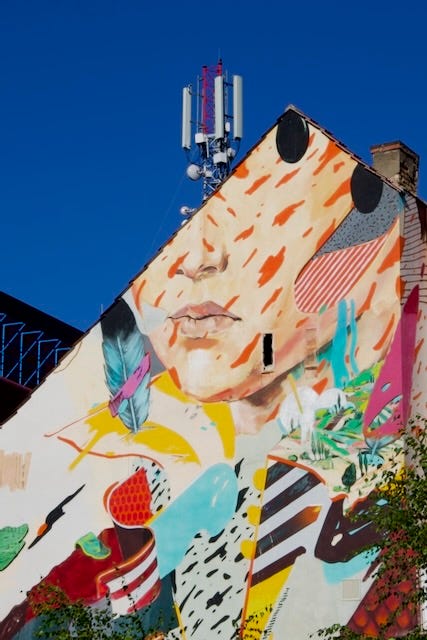Hedonic Adaptation
Is our inability to manifest our desires an aspect of human nature or does it reflect a deeper fear?
An interesting aspect of human nature is our tendency to flatline desired experiences. What starts as invigorating, or intolerable, eventually plateaus as we assimilate what is happening into our accepted tolerance level of comfortable experience. We habitually transform positive into routine, eros into friendship, magic into reason. We can also transform ignoring as attention, abuse as acceptable behavior, and pain as ordinary. As humans, we are so good at normalizing life to avoid core self transformational change.
Ever heard of hedonic adaptation - “the observed tendency of humans to quickly return to a relatively stable level of happiness (or sadness) despite major positive or negative events or life changes.” As much as we may long for desires to manifest, we humans tend to mitigate the intensity of experiencing what we want when what we desire finally does come to us. We bring ourselves back into what we know and can accept as a reality. As much as we say we may want something to change us, ultimately anything that comes into our life that will actually create a change at the core of us is also something we are going to feel threatened by.
Life changing experiences are habitually put back into the comfortable box of our own accepted identity.
Today’s post is for the part of you that lives in perpetual wanting. This post is for those of you who have an opportunity to break out of a pattern and instead of jumping on it, you have found a reason to retreat back into the life you know. This post is for those of you who have radically made a choice to change your life and then backpedaled as soon as you have what you wanted. The dynamic all of these situations have in common is one of wanting but not being able to experience the fulfilling.
Ever want more money, get a raise or windfall, and then discover that you STILL haven’t gotten rid of the feeling of needing more money?Ever meet a person who checked all your boxes but once they wanted you too or you began a relationship with them, faults in them amassed?Ever desire something new to happen to you but once it does, you renege or talk yourself out of it and go back to your comfortably uncomfortable life?Ever manifest something you thought that you desired and then immediately begin to fear cycle into everything that could go wrong?Have you had something negative happen to you and your first reaction is one of relief? Like now you don’t have to worry so much anymore?
When a positive life changing event materializes, we will let it happen to us…at first. But distrust creeps its way in and threats loom under the surface. Many of us start to fear what will come next. A question such as: “What if I get used to a life of having what I want?” arises. Over time, our story telling self starts to infiltrate our pleasure to ensure that we go back to feeling normal. We start to focus on what’s wrong to equalize the positive feelings and negate those feelings we are uncomfortable sustaining. We go back to our relative norm to feel stable. This dynamic plays out in relationship to our transformational self as well as to events in the physical world.
When a negative life changing experience arises, we have no choice but to let it happen to us at first. In this case, our own disbelief and fear create a similar stabilization point. When waking every morning to the negative reality is overwhelming, so we seek and over focus on the positive to tolerate the intolerable. Our insecurities override our desire to find a way to work with the negative experience as transformation. We tolerate the negative becoming normal and convince ourselves we can live with it. We focus on the positive to get us out of the inevitability of the negative experience. This brings us into our relative norm so we can feel stable and, in some cases, sane.
We turn positive and negative experiences into an opportunity to find fault, seek what is wrong, or take for granted what the experience itself is offering to us.
Positive or negative experiences are often taken to a whole other step when we feel their capacity to change the life we live or the person we belief ourselves to be.
Experiences that are most likely to change our core self are the ones that threaten us the most.

Personal Reflection: When I attended the Barbara Brennan School of Healing, our second year of school was the year of life changing transformation. Over and over our teachers warned us to not make rash decisions in our own lives throughout this intense year of change. Ironically, this year was also the year that ended many partnerships and caused divorces. This always felt weird to me. I spent many years focused on the question of, “Why?” With my years of private practice under my belt, I still see this same pattern. It has led me to conclude that we ultimately sabotage the change we want the most.
Genesis of the Threat
The idealization of our desires calls to us. When desire is realized, the threat of what changes haunts us. We believe change is something to strive for but not metabolize. As a rule, we are too stagnant about our idea of self. What we want to hold onto the most about ourself is what we need to let go of, but also what we will fight to let go of. We want transformation that is made through force and push, not by allowing and accepting.
Our essential inability to allow effective change to settle in our core self and our self identity is what prevents us from allowing new experiences to remain alive and vital. It is easier to go back to a norm of existence than it is to change our story. We prefer that the past hold itself not to our story of becoming but to our creation story. Here lies another struggle between unknown and known. We fight the genesis of our own growth, the creation of a completely new story.
Our truest self is meant to be like clay. Instead we treat our ideas of self as if they are cement.
It is normal to want to control transformational change. We want to choose what we leave behind and what we take with us. Effective transformation doesn’t work that way. It is similar to an experience that we have that allows us to feel something we do not trust ourselves to feel. Most transformation is stuck in the cycle of the hedonistic treadmill, destined to let history repeat itself.
The transformation that we face on a “who am I?” level is the most threatening change. Something about ourself will have to die. Some idea we have about ourself will no longer be allowed to thrive. This process of stepping into life changing our “I am” cannot be one of control. It has to be one of surrender.
Awareness Note: The place to process your own treadmill starts with understanding in yourself what you distrust and what you cling to. By actively working on letting go of control in the places you do not trust yourself, transformational change will not seem like as much of a threat. To surrender means to get curious about what you control and why you do it, and then test yourself in letting go. To manifest your desires, you need to let go of all outcome.
We can only contain what we can hold on to. When we experience something outside our realm of experience, we turn on it because we distrust it. What we cannot control is destined to become something we reject. When transformation occurs inside us, we need the outside world to reflect our internal change. Yet when the outside world actually reflects our change, we are more likely to distrust what is happening than surrender to any new sense of “I am.” A young and untested “I am” evolves from externally metabolizing the new shift that has arisen in us.
When we begin to have an internal genesis, transformation is going to be an unacknowledged threat. Transformation is safer when it is felt as a perpetual desire. Anytime we see transformation as a threat, it is because of our distrust of our own ability to change. Ironically, this means that we are often creating what we want in life but we do not know how to make the leap into taking it in. Our demands and blind spots prevent us from noticing that we are recieving what we desire.
Transformation is asking us to embody differently, to redefine our story of self, to live differently than we normally do. Rather than trust our SELF, we enter into a cruel game of self sabotage and ignorance, finding ways to make sure that the transformation we desire is not what we experience. We cannot accept what the transformation is asking of us and we cannot believe that we are capable of embracing it. Instead, we seek our way back to our relative norm. We unconsciously want the comfort zone of who we know we are, how we know to act, and what we have the capacity to feel.
As a rule, we do not trust ourselves to change. We doubt our self in relationship as we change because we do not have conviction in our own ability to maintain the change we have created. Rather than test what we are becoming , we demand others change to accommodate this newer version of self. We fear that others will bring us back to who we were. We demand change to avoid our own fear. We doubt our ability to hold the container of our own change. What results is the demand that others change with us.
Emergence of Demand
I have noticed in my work that a demand for outside change often occurs on the cusp of personal transformation. Even without personal growth, it is likely that issues in relationships come from a desire to make the person we love into someone else. It is also likely that when we come into contact with the dynamic of perpetual wanting, anyone in our life is going to feel the brunt of our unfulfilled desire in our own demand for them to change.

I have many theories about what drives this demand as well as observations on what is happening underneath outward demands. As with most common problems, there is the seen and spoken that enshrouds the unseen and unwanted. When change is demanded, something is attempting to poke its head out of shadow. If this attempt to transform ourself is going to go well, it cannot happen only through the obvious mechanism of demand. Something unseen needs to be addressed for a healthy shift to arise inside our self. We need to learn to trust our transformation as it weathers the imperfections of reality.
In relationships and in life, eventually we go from discovering and enjoying to seeing what is wrong and then to making a demand for a change. Sooner or later we say to a person we love something like, “If you don’t (blank), then I am not sure if we can be together anymore.” To the world we say something more generic, “If (blank) doesn’t change about the world, then I will not let myself fully participate in it.” We demand a specific change from what we cannot accept in another or the world around us as a reality. This reflects what we cannot accept inside ourself.
Changes that we demand seems pretty straightforward. However, we need to be especially aware when we demand that what we seek is not open to imperfection. All demands are subject to making mistakes and humanization (aka the real world). This is the place where the unconscious is playing a more pervasive role within our understood demand for change.
We have unconscious shadow at play whenever we want someone or something to behave the way we want them to. Full Stop.
This happens when we “need” the world or a person to become something it is not and it has to change in the way we demand to fully embody. When we demand, it is more likely that something is being avoided than an internal change is being addressed. Any inflexibility or threat we hold is a sign of an underlying insecurity that is being avoided within our desire for personal growth. The unconscious demand we hold is not relational and it is certainly not open-minded. As we become aware of the demanding aspect of our desire for change, we can begin to look at the underlying causes of the demand and ferret out the unconscious demand that is intertwining our more conscious statement for a desire to experience change.
Process Note: Demands being accepted as demanding is actually healthy, at first. For those of us who are not comfortable taking up space or speaking our truth, being demanding is a step in the right direction to the self. As long as you are aware that the process does not stop with the demand, allowing a demand to be intense or mean or imperfect is a step towards receiving what you desire and trusting your transformation more fully.
The place we most often actively demand change is in those we care about. Demanding the world changes the way we want it to creates a threat type of relationship where we withhold aspects of ourself to avoid the reality of duality in our lives. With people, however, we feel more in control. It is those we let close to us who often get the brunt of our demand for change.
Hard Truth: Any demand for another person to change for us is actually wounding that person.

The world as it stands is complex, interconnected and interrelated. It is full of the known and unknown, the understood and the misunderstood. To fully participate in life, we have to be willing to let complexity be present in our desires. No desire is going to be met in the exact way we want it to be met. Actually desire that is addressed and worked with transformationally is going to be met beyond our wildest dreams! Yet we will never notice the meeting if we cannot allow our “I am” to transform as our desires are met. We have to surrender to ourselves as works of art, allowing our desires to work through us into the interconnected nature of the world as everything we want comes to is in its own inconceivable way.
If you are trying to manifest anything for yourself by knowing how it has to go to receive the desire you believe you want, you are missing out on the potent magic of life and setting yourself up for being another human succumbing to hedonic adaptation. Life just isn’t any fun without the unknown having its say in our desires.
I am going to stop here today and slow this down. Next time I will answer the following group of questions:
When does demand wound people we love and how do we balance natural demand in a way that supports both the self and the people we are in relationship with?
What about our own growth creates a demand that all who are around us grow?
What about personal change makes us incapable of withstanding or the lack of change in another or noticing when they do change?



